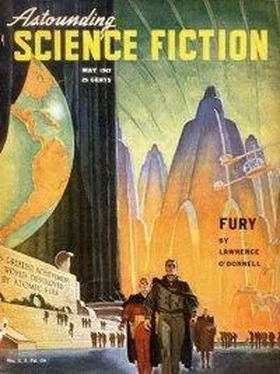Thomas Sherred - E for Effort
Здесь есть возможность читать онлайн «Thomas Sherred - E for Effort» весь текст электронной книги совершенно бесплатно (целиком полную версию без сокращений). В некоторых случаях можно слушать аудио, скачать через торрент в формате fb2 и присутствует краткое содержание. Год выпуска: 1947, Издательство: Street & Smith Publications, Inc., Жанр: Фантастика и фэнтези, на английском языке. Описание произведения, (предисловие) а так же отзывы посетителей доступны на портале библиотеки ЛибКат.
- Название:E for Effort
- Автор:
- Издательство:Street & Smith Publications, Inc.
- Жанр:
- Год:1947
- ISBN:нет данных
- Рейтинг книги:3 / 5. Голосов: 1
-
Избранное:Добавить в избранное
- Отзывы:
-
Ваша оценка:
- 60
- 1
- 2
- 3
- 4
- 5
E for Effort: краткое содержание, описание и аннотация
Предлагаем к чтению аннотацию, описание, краткое содержание или предисловие (зависит от того, что написал сам автор книги «E for Effort»). Если вы не нашли необходимую информацию о книге — напишите в комментариях, мы постараемся отыскать её.
E for Effort — читать онлайн бесплатно полную книгу (весь текст) целиком
Ниже представлен текст книги, разбитый по страницам. Система сохранения места последней прочитанной страницы, позволяет с удобством читать онлайн бесплатно книгу «E for Effort», без необходимости каждый раз заново искать на чём Вы остановились. Поставьте закладку, и сможете в любой момент перейти на страницу, на которой закончили чтение.
Интервал:
Закладка:
“Weren’t you around here—”
I wiped foam off my mustache. “Last night? No, but I wish I had. I’d have caught my bus. No, I was in the Motor Bar last night at eight. And was still there at midnight.”
He chewed his lip thoughtfully. “The Motor Bar. Just down the street?” And I nodded. “The Motor Bar. Hm-m-m.” I looked at him. “Would you like… sure, you would.” Before I could figure out what he was talking about he went to the back and from behind the beaverboard screen rolled out a big radio-phonograph and another jumbo bottle. I held the bottle against the light. Still half full. I looked at my watch. He rolled the radio against the wall and lifted the lid to get at the dials.
“Reach behind you, will you? The switch on the wall.” I could reach the switch without getting up, and I did. The lights went out. I hadn’t expected that, and I groped at arm’s length. Then the lights came on again, and I turned back, relieved. But the lights weren’t on; I was looking at the street!
Now, all this happened while I was dripping beer and trying to keep my balance on a tottering chair—the street moved, I didn’t and it was day and it was night and I was in front of the Book-Cadillac and I was going into the Motor Bar and I was watching myself order a beer and I knew I was wide awake and not dreaming. In a panic I scrabbled off the floor, shedding chairs and beer like an umbrella while I ripped my nails feeling frantically for the light switch. By the time I found it— and all the while I was watching myself pound the bar for the bar-keep—I was really in fine fettle, just about ready to collapse. Out of thin air right into a nightmare. At last I found the switch.
The Mexican was looking at me with the queerest expression I’ve ever seen, like he’d baited a mousetrap and caught a frog. Me? I suppose I looked like I’d seen the devil himself. Maybe I had. The beer was all over the floor and I barely made it to the nearest chair.
“What,” I managed to get out, “what was that?”
The lid of the radio went down. “I felt like that too, the first time. I’d forgotten.”
My fingers were too shaky to get out a cigarette, and I ripped off the top of the package. “I said, what was that?”
He sat down. “That was you, in the Motor Bar, at eight last night.” I must have looked blank as he handed me another paper cup. Automatically I held it out to be refilled.
“Look here—” I started.
“I suppose it is a shock. I’d forgotten what I felt like the first time I … I don’t care much any more. Tomorrow I’m going out to Phillips Radio.” That made no sense to me, and I said so. He went on.
“I’m licked. I’m flat broke. I don’t give a care any more. I’ll settle for cash and live off the royalties.” The story came out, slowly at first, then faster until he was pacing the floor. I guess he was tired of having no one to talk to.
His name was Miguel Jose Zapata Laviada. I told him mine; Lefko. Ed Lefko. He was the son of sugar beet workers who had emigrated from Mexico somewhere in the Twenties. They were sensible enough not to quibble when their oldest son left the back-breaking Michigan fields to seize the chance provided by a NYA scholarship. When the scholarship ran out, he’d worked in garages, driven trucks, clerked in stores, and sold brushes door-to-door to exist and learn. The Army cut short his education with the First Draft to make him a radar technician, the Army had given him an honorable discharge and an idea so nebulous as to be almost merely a hunch. Jobs were plentiful then, and it wasn’t too hard to end up with enough money to rent a trailer and fill it with Army surplus radio and radar equipment. One year ago he’d finished what he’d started, finished underfed, underweight, and overexcited. But successful, because he had it.
“It” he installed in a radio cabinet, both for ease in handling and for camouflage. For reasons that will become apparent, he didn’t dare apply for a patent. I looked “it” over pretty carefully. Where the phonograph turntable and radio controls had been were vernier dials galore. One big one was numbered 1 to 24, a couple were numbered 1 to 60, and there were a dozen or so numbered 1 to 25, plus two or three with no numbers at all. Closest of all it resembled one of these fancy radio or motor testers found in a super superservice station. That was all, except that there was a sheet of heavy plywood hiding whatever was installed in place of the radio chassis and speaker. A perfectly innocent cache for—
Daydreams are swell. I suppose we’ve all had our share of mental wealth or fame or travel or fantasy. But to sit in a chair and drink warm beer and realize that the dream of ages isn’t a dream any more, to feel like a god, to know that just by turning a few dials you can see and watch anything, anybody, anywhere, that has ever happened —it still bothers me once in a while.
I know this much, that it’s high frequency stuff. And there’s a lot of mercury and copper and wiring of metals cheap and easy to find, but what goes where, or how, least of all, why, is out of my line. Light has mass and energy, and that mass always loses part of itself and can be translated back to electricity, or something. Mike Laviada himself says that what he stumbled on and developed was nothing new, that long before the war it had been observed many times by men like Compton and Michelson and Pfeiffer, who discarded it as a useless laboratory effect. And, of course, that was before atomic research took precedence over everything.
When the first shock wore off—and Mike had to give me another demonstration—I must have made quite a sight. Mike tells me I couldn’t sit down. I’d pop up and gallop up and down the floor of that ancient store kicking chairs out of my way or stumbling over them, all the time gobbling out words and disconnected sentences faster than my tongue could trip. Finally it filtered through that he was laughing at me. I didn’t see where it was any laughing matter, and I prodded him. He began to get angry.
“I know what I have,” he snapped. “I’m not the biggest fool in the world, as you seem to think. Here, watch this,” and he went back to the radio. “Turn out the light.” I did, and there I was watching myself at the Motor Bar again, a lot happier this time. “Watch this.”
The bar backed away. Out in the street, two blocks down to the City Hall. Up the steps to the Council Room. No one there. Then Council was in session, then they were gone again. Not a picture, not a projection of a lantern slide, but a slice of life about twelve feet square. If we were close, the field of view was narrow. If we were further away, the background was just as much in focus as the foreground. The images, if you want to call them images, were just as real, just as lifelike as looking in the doorway of a room. Real they were, three-dimensional, stopped by only the back wall or the distance in the background. Mike was talking as he spun the dials, but I was too engrossed to pay much attention.
I yelped and grabbed and closed my eyes as you would if you were looking straight down with nothing between you and the ground except a lot of smoke and a few clouds. I winked my eyes open almost at the ends of what must have been a long racing vertical dive, and there I was, looking at the street again.
“Go any place up the Heaviside Layer, go down as deep as any hole, anywhere, any time.” A blur, and the street changed into a glade of sparse pines. “Buried treasure. Sure. Find it, with what?” The trees disappeared and I reached back for the light switch as he dropped the lid of the radio and sat down.
“How are you going to make any money when you haven’t got it to start?” No answer to that from me. “I ran an ad in the paper offering to recover lost articles; my first customer was the Law wanting to see my private detective’s license. I’ve seen every big speculator in the country sit in his office buying and selling and making plans; what do you think would happen if I tried to peddle advance market information? I’ve watched the stock market get shoved up and down while I had barely the money to buy the paper that told me about it.
Читать дальшеИнтервал:
Закладка:
Похожие книги на «E for Effort»
Представляем Вашему вниманию похожие книги на «E for Effort» списком для выбора. Мы отобрали схожую по названию и смыслу литературу в надежде предоставить читателям больше вариантов отыскать новые, интересные, ещё непрочитанные произведения.
Обсуждение, отзывы о книге «E for Effort» и просто собственные мнения читателей. Оставьте ваши комментарии, напишите, что Вы думаете о произведении, его смысле или главных героях. Укажите что конкретно понравилось, а что нет, и почему Вы так считаете.












